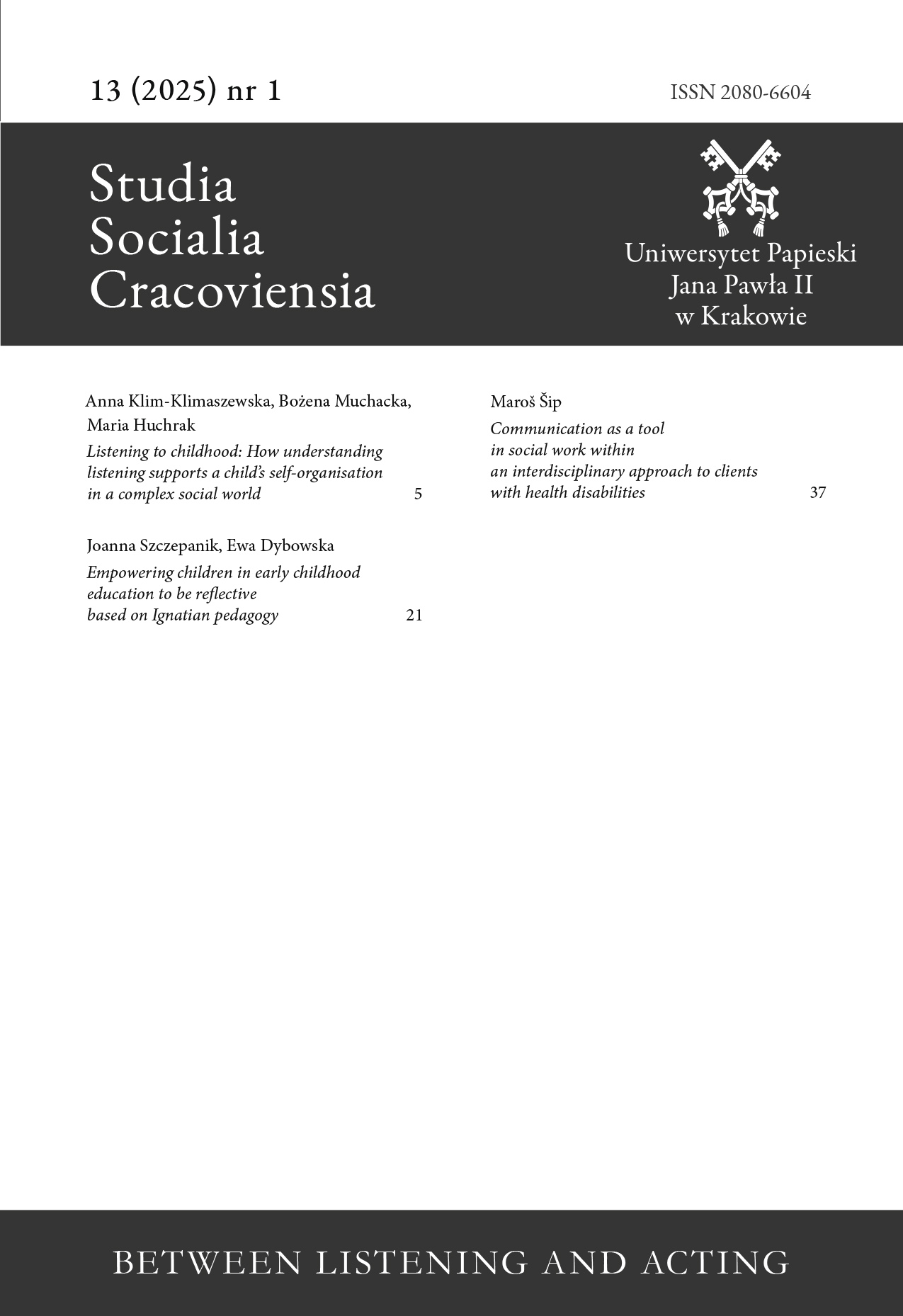Empowering children in early childhood education to be reflective based on Ignatian pedagogy
DOI:
https://doi.org/10.15633/ssc.13102Keywords:
reflexivity, early childhood education, Ignatian pedagogyAbstract
In the face of modern civilisation and globalisation, one key educational challenge is to foster reflexivity and critical thinking from an early age. While adolescents are expected to reflect on educational and social issues, children aged 7–10 are rarely supported in developing this competence. Ignatian pedagogy — based on context, experience, action, reflection, and evaluation — emphasises introducing children to reflection in a developmentally appropriate way. This article presents practical methods inspired by the Ignatian model to foster reflection in four areas: conceptual, metacognitive, socio-emotional, and spiritual. Drawing on literature analysis, observation, and educational innovation, the paper shows how early childhood educators can implement reflective activities in daily practice. The teacher’s role is crucial, as they model reflective attitudes. Despite the belief that children are not ready for reflection, the article demonstrates that well-designed pedagogical strategies can support the development of reflective habits.
References
Atienza, R. J. & Go, J. C. (2023). Uczenie się przez refrakcję. Praktyczny przewodnik po pedagogice ignacjańskiej XXI wieku (K. Lewicka, Tłum.). Wydawnictwo WAM.
Casalini, C. (2021). Cura personalis: The care of the person and the roots of Jesuit pedagogy. In J. Braga, & M. Santiago de Carvalho (Eds.). Philosophy of care. New approaches to vulnerability, otherness and therapy. Springer Cham. https://doi.org/10.1007/978-3-030-75478-5_15
Charakterystyczne cechy jezuickiego wychowania. (2006). In B. Steczek (Ed.). Podstawy edukacji ignacjańskiej (pp. 7–95). Wyższa Szkoła Filozoficzno-Pedagogiczna „Ignatianum”, Wydawnictwo WAM.
Chrost, M. (2021). Bedeutung der Reflexion im Bildungsbereich am Beispiel der ignatianischen Pädagogik. Teologia i Moralność, 16(1), 61–73. https://doi.org/10.14746/tim.2021.29.1.4
Dewey, J. (1938). Experience and education. Simon and Schuster.
Dewey, J. (1910). How we think. D. C. Heath and Company. https://doi.org/10.1037/10903-000
Dewey, J. (2002). Jak myślimy? (Z. Bastegnówna, Tłum.). Ediciones Altaya, De Agostini Polska.
Dębska, E. (2020). Profile refleksyjności i typy karier. Perspektywa poradoznawcza. Wydawnictwa Uniwersytetu Warszawskiego.
Dybowska E., Królikowski W. (2017). Rozwój człowieka w pedagogii ignacjańskiej. In A. Walulik & J. Mółka (Eds.), Septuaginta pedagogiczno-katechetyczna (pp. 209–224), Akademia Ignatianum.
Dybowska, E. (2013). Wychowawca w pedagogice ignacjańskiej, Akademia Ignatianum, Wydawnictwo WAM.
Dybowska, E. (2022). Pedagogika ignacjańska w świecie VUCA. Horyzonty Wychowania, 21(57), 11–19. https://doi.org/10.35765/hw.2022.57.03
Karczmarzyk, M. A. (2015). Notatka rysunkowa w kształceniu przedszkolnymi wczesnoszkolnymi. Pedagogika przedszkolna i wczesnoszkolna, 3(1), 21–25.
Kolvenbach, P. H. (1992). Właściwości pedagogiki propagowanej przez Towarzystwo Jezusowe. Horyzonty Wiary (14), 5–16.
Marek, E. (2016). Pedagogiczna interpretacja metody projektów w programach kształcenia zintegrowanego. Konteksty Pedagogiczne, 1(6), 19–42. https://doi.org/10.19265/kp.2016.1.6.101
Marek, Z. (2021). Pedagogia i pedagogika ignacjańska (jezuicka). Horyzonty Wychowania, 20(56), 11–21. https://doi.org/10.35765/hw.2071
Marek, Z., & Walulik, A. (2022). Ignatian spirituality as inspiration for a pedagogical theory of accompaniment. Journal of Religion and Health, 61(6), 4481–4498. https://doi.org/10.1007/s10943-022-01628-z
OECD, (2010). The definition and selection of key competencies. https://one.oecd.org/document/EDU/EDPC/ECEC/RD(2010)26/en/pdf
Pedagogia ignacjańska. Podejście praktyczne. (2006). In B. Steczek (Ed.). Podstawy edukacji ignacjańskiej (pp. 97–165). Wyższa Szkoła Filozoficzno-Pedagogiczna „Ignatianum”, Wydawnictwo WAM.
Perkowska-Klejman, A. (2013). Modele refleksyjnego uczenia się. Teraźniejszość — Człowiek — Edukacja, 16(1), 75–90. https://insted-tce.pl/ojs/index.php/tce/article/view/14
Perkowska-Klejman, A. (2014). Cztery poziomy refleksyjności studentów. Teraźniejszość — Człowiek — Edukacja, 17(2), 69–78. https://insted-tce.pl/ojs/index.php/tce/article/view/30
Piaget, J. (1966). Narodziny inteligencji dziecka (M. Przetacznikowa, Tłum.). PWN.
Schön, D. A. (1987). Educating the reflective practitioner: Toward a new design for teaching and learning in the professions. Jossey-Bass.
Steczek, B. (Ed.). (2006). Podstawy edukacji ignacjańskiej. Wyższa Szkoła Filozoficzno-Pedagogiczna „Ignatianum”, Wydawnictwo WAM.
Szymczak, J. (2017). Typologia nauczycielskiej refleksji dotyczącej pracy z uczniami. Problemy Wczesnej Edukacji, 38(3), 50–60. https://doi.org/10.26881/pwe.2017.38.04
Tapscott, D. (2009). Grown Up Digital: How the Net Generation Is Changing Your World. McGraw Hill.
Downloads
Published
Issue
Section
License
Copyright (c) 2025 Joanna Szczepanik, Ewa Dybowska

This work is licensed under a Creative Commons Attribution 4.0 International License.
Authors who publish with this journal agree to the following terms:
- Authors retain the copyright and full publishing rights without restrictions, and grant the journal right of first publication with the work simultaneously licensed under a Creative Commons Attribution 4.0 International License that allows others to share the work with an acknowledgement of the work's authorship and initial publication in this journal.
- Authors are able to enter into separate, additional contractual arrangements for the non-exclusive distribution of the journal's published version of the work (e.g., post it to an institutional repository or publish it in a book), with an acknowledgement of its initial publication in this journal.
- Authors are permitted and encouraged to post their work online (e.g., in institutional repositories or on their website) prior to and during the submission process, as it can lead to productive exchanges, as well as earlier and greater citation of published work (See The Effect of Open Access).

